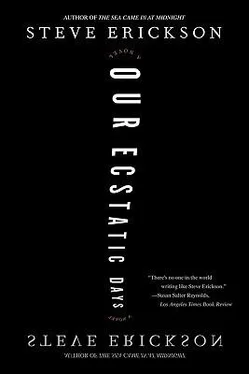the toilet down the hall and making it just in time to see the glistening white
He peers inside.
He looks so deeply — although he can’t fit in his whole head as he did into the tank’s gun that morning twelve years ago — that when he hears the song, of course he thinks it’s coming from the other end of the dark to where the vent leads, from where and when he first heard it twelve years ago. Same strange distant Moorish drums, same dreamy Middle Eastern melody with the soft Spanish horns in the background, and the same woman’s voice of another century’s turn: excited, he turns to call to the girl who’s been trying to track down this very song, astonished that the song should happen to present itself at this very moment just as she happens to be here — only to realize the song isn’t coming from the vent at all but her radio. “But that’s it,” he says to her. What? she says sleepily, and he says, “That’s it,” pointing at the radio.
She looks at the radio a moment. “Are you sure?”
“That’s it.”
“Well that’s odd isn’t it,” she finally says. She listens awhile. “You’re sure.” She listens some more. “I don’t think this is that old a song.”
“Do you know it?”
“No but I think perhaps I’ve heard them play it before and I don’t think they would play an old song like this that often, if it was that old.” She says, “It doesn’t sound that old.”
“How can you tell?”
rain of my boy run from my body, and at that moment I thought of all the
“Well, I suppose I can’t,” she confesses. He turns back to the vent and from deep down out of the darkness feels as he did twelve years ago the same gust in his face; it smells of that same morning, the vent a tunnel to that very morning and that very place, at the other end of which is the portal of a gun barrel. This is when he realizes that, twelve years ago, what he actually heard was this very moment now, in this time and place, up here overlooking the world on this very night — that somewhere at the other end of this tunnel he’s there standing on the Square, his Other Self at an irrevocable moment, a young man of nineteen alone before the tanks with his head in the barrel of a gun, listening to a song coming from a girl’s radio twelve years and twelve thousand miles away. That what now blows through this tunnel is the Oblivion Wind back and forth across the shadowyears between the end of the Twentieth Century that morning, and this night — although he can’t imagine why this particular night, when nothing would seem to be happening of any importance at all.
He turns to see her lying there on his bedding, gold hair around her head ablaze in the ovulating moon. He walks over to her; she dozes at his feet. He has this distracted impulse to lie next to her, only because he’s suddenly so tired, but of course she would only take it wrong. If she could see him now, he wonders if he would appear to her as he feels: a man caught mid-transport. Uh, he whispers, we should go down now I think, but she doesn’t answer and he just nods in the dark and mumbles I’ll come back for you in the morning then, and turns to the dank light of the elevator, doors closing on his bewildered face. Briefly her eyes flutter to the sound of the closing doors, having somewhere in her semiconsciousness heard him speak, and now she answers from her sleep, But I have no place to go. She stumbles up from the bedding because she has to pee, and stripping off her jeans she
nights after I first learned he was inside me that I had stood in windows
half-registers the tsunamic vista of dawn’s armada in a far enflamed east. Then she slides back into the sleeping bag on the mattress at the base of the throbbing antenna above her.
In her head she keeps seeing Sara listening to that wall down below. One of the last conscious thoughts she has is that her lifè has veered wildly out of control lately and she likes to be in control, even if it means assuming the well-defined role of slightly subservient daughter, its definitions threatened only by her role of lover. But Sara is gone now or perhaps, she thinks at the end, I’m the one who’s gone. Not long before the crash of morning light she sleeps the sleep of the dead, as Sara always put it, and dreams of her own birth, her mind ticking down all her memories like the last hours of summer.
Two women on a train. Their destination is the end of a lie, although they don’t yet know it’s a lie. The older woman has truly convinced herself that in her last days she wants to get as far from the lake as she can, that she’ll die free of it at last; and thus the 2029–2031 younger woman arranged for them to leave the Chateau X in the dead of night by boat, although not sailed by the young man who loved her so unrequitedly and to whom she couldn’t bear to explain she was leaving. Rather the two other women Brontë met months earlier from the Freek Recherche lunatique drove her and the Mistress along the serrated shoreline in a beat-up thirty-year-old
exposing my pregnant belly to the city and the outside world in order to try
Jag that barely had room for them to the port at Los Feliz, with its abandoned observatory looming in the hills above.
From there, over the course of twenty-two slow hours a ferry sailed the two women further inland to San Gabriel. Lulu is sick. On the ferry deck bundled in a large coat and scarf and swathed in the gray of the wind, black late-autumn countryside and the solar casbahs of outer zedberia passing by and white waves on the lake like the veils of a hundred drowned brides, she seemed to Brontë only intermittently conscious of the journey. On the train now Brontë reproaches herself for bringing Lulu. But it’s too late, they can’t go back; they’re traveling on Armand’s money and, at that moment, Armand is shackled blindfolded and naked in the Chateau dungeon with the little red ball in his mouth, delirious far beyond any thrilling contemplation of the cracking of the walls around him and the lake beyond, delirious even beyond wondering when his Mistress Bronte is going to return. His henchmen wait in a limo on shore. In thirty-six hours it will begin to cross the narrow landfill of their minds that perhaps something’s amiss, at which point they’ll begin calling a cell phone that lies on the stone dungeon floor two wicked inches beyond the farthest expanse of Armand’s chains. Sometimes Armand can hear the footsteps of his Mistress in the Lair upstairs, or so he supposes. What he actually hears are the steps of another man searching the Chateau for one woman he knows of, and another he won’t admit to himself he knows of.
By early morning Brontë and Lulu reached San Gabriel port. They missed by twenty minutes a train that comes through only once a night, when it’s on time at all, and winds up in Chicago. Unsure how stupid she could count on Armand’s boys to be, or how far they might come to find her once they retrieved their boss, Brontë didn’t much care for the idea of sitting around the station
and prepare him for its chaos, and in that minute there in the toilet when I was
another twenty-four hours. In the small waiting room of the terminal, she found a kid who just put his girlfriend on the train, eating a sandwich out of a vending machine; she offered him one of Armand’s hundred-dollar bills if he would drive them to the next station and beat the train there doing it. Is she all right? the kid said looking at Lulu, chewing his sandwich in deep thought. She’s sick, Brontë answered. I need to get her on that train. Forty-five minutes later the three were careening through the San Berdoo badlands into the rising morning sun. Slipping in and out of an ecstasy of sunlight through the windows, trying to remember the color blue, in her mind Lulu added greens to grays to see if they made blue together.
Читать дальше











